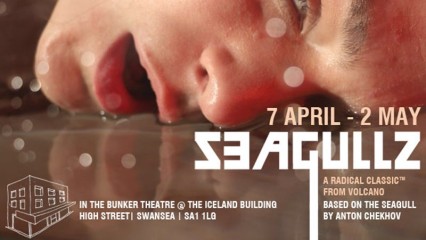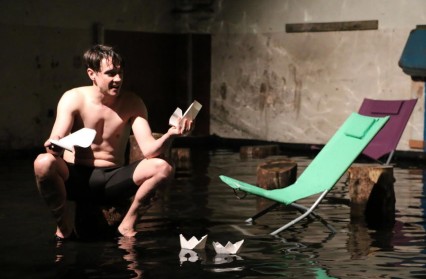Volcano Theatre Company, the Bunker, Swansea
Anton Chekov’s The Seagull was first performed in 1896 to a very hostile audience. The play, which was later considered to be the first of the dramatist’s four major plays, tells the story of fading actress Irina Arkadina, her lover, the writer Boris Trigorin, the youthful Nina and Irina’s suicidal son Konstantin Tréplev. Its four acts follow the lives of these flippant art types as they spend their summers in a country estate by the lake, falling in and out of love with each other, striving for genius through writing and searching for meaning in life. The characters, as opposed to the scenarios in which they find themselves, are at the heart of the play, and Volcano’s deconstructed piece Seagulls uses this as its foundation.
 Staged at their new bunker space on Swansea High Street, the production imagines the characters as seagulls, a metaphor for free, careless beings who are easily destroyed by man. As the audience enter the bare space, the actors hang from the ceilings in harnesses. As the piece begins, Mairi Phillips as Irina and Neal McWilliams as Trigorin slowly lower themselves, trying not to wake the others. After the others follow suit, we are thrown into Konstantin’s symbolic play, with Nina playing the lead. Irina watches from the side lines, laughing at her son’s attempt to be profound. The piece dips in and out of traditional storyline, with added sections which are more contemporary and thus arguably more relatable. In particular, a scene in which Irina demands a gymnastic display from everybody (with herself centre stage of course) is particularly humorous.
Staged at their new bunker space on Swansea High Street, the production imagines the characters as seagulls, a metaphor for free, careless beings who are easily destroyed by man. As the audience enter the bare space, the actors hang from the ceilings in harnesses. As the piece begins, Mairi Phillips as Irina and Neal McWilliams as Trigorin slowly lower themselves, trying not to wake the others. After the others follow suit, we are thrown into Konstantin’s symbolic play, with Nina playing the lead. Irina watches from the side lines, laughing at her son’s attempt to be profound. The piece dips in and out of traditional storyline, with added sections which are more contemporary and thus arguably more relatable. In particular, a scene in which Irina demands a gymnastic display from everybody (with herself centre stage of course) is particularly humorous.
The set, which initially appears to be a simple empty space, is revealed to be much more. The actors draw a circle in chalk and ask the audience to join them through asking questions such as ‘dreams or reality?’, ‘water or vodka?’ echoing themes of the play. The set is then swiftly changed and the backdrop removed to reveal a substantial pool of water, representative of Chekov’s lake. The reveal and execution of this part of the set was particularly impressive and certainly added a sense of scale to the production.
The ensuing performance take place principally in the water. Mairi gives a touching performance as Irina remembers the death of her child who drowned in the lake. The ensemble cast is particularly strong, but it is Mairi Phillips’ energy as Irina and Christopher Elson’s performance as the troubled Konstantin which really stand out. Konstantin’s final scene with Nina is poignant and Elson convincingly captures the character’s depressive state.
Not a second passes without something to keep the audience transfixed. There is constant action, ranging emotions and a variety in the pace. At times the story seems to get a little lost, and one can’t help sensing that a basic knowledge of Chekov’s play might be necessary to fully appreciate the piece. That said, Paul Davies’ direction is both dynamic and pacy. The production is completely strange and beautiful. It is ridiculous at times with nakedness and choreographed frantic dancing to The Clash’s ‘Should I stay or should I go?’ Volcano’s interpretation is fresh and full of energy. A fantastic re-imagining of the original play, this company is certainly capable of injecting life into classic texts.
Phot credit: Erin Rickland












